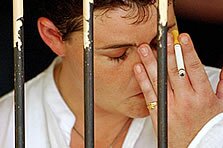|
"After all, Lawrence had done this once before"

The terrifying last moments of freedom for two drug runners are revealed in this edited extract from One-way Ticket, The Untold Story of the Bali 9 by CINDY WOCKNER and MADONNA KING.
RENAE Lawrence and Martin Stephens turned to each other, smiled and shook hands.
They'd done it. Or so they thought. It was the performance of their lives and everyone seemed to have fallen for it, right from the moment they climbed out of their taxi in front of Bali's Ngurah Rai international airport.
They had looked just like everyone else, holiday-weary and sunburnt, as they grabbed their bags and headed for the queue to check in to their Australian Airlines flight back to Sydney and their homes.
Lawrence and Stephens hadn't even picked out the clothes they wore now - someone else had done that for them. Just like someone else had dressed them, plastering chunks of heroin on to their thighs and torsos with cheap adhesive tape. But no one else knew that. No one was watching them. They were fitting in just fine.
It was just a few minutes past 8pm on Sunday, April 17, 2005.
Climbing out of the taxi, Stephens and Lawrence were careful to carry their own bags. They didn't fidget or look nervous, their self-assurance strong that their secret was safe. After all, Lawrence had done this once before just six months ago, she told police - and nothing had gone wrong; the $10,000 bonus she received at the other end proof she had survived the few nerves that surfaced every now and again.
Together, the Sydneysiders walked purposefully through the doors of the big international departure terminal. Once inside, they dumped their bags on the big X-ray conveyor belt . . . a dog sat at the other end - a dog trained to sniff out those who broke Indonesia's tough drug laws.
Lawrence and Stephens knew they had to walk past the dog without it picking up the scent of the wads of heroin strapped to their bodies. At that time they didn't know how much was taped to them, or what it was worth. They did, however, know it was a risk; a life-threatening one.
They wandered past the canine. If they were nervous, they hid it well.
Lawrence and Stephens chatted, taking their place at the popular Qantas/Australian Airlines check-in counter.
The canine reappeared, its handlers ensuring not much space was left between the two Australian travellers and their dog. But still nothing.
Not a whiff.
Lawrence and Stephens walked towards the escalator. Twice they'd been tested, and neither had folded. No alert. No alarm. No suspicion. And that's when they turned and smiled conspiratorially at each other.
They had made it, their handshake an intimate sign of victory that their secret was safe. Onwards and upwards from here, across the skies that joined Australia and its back-yard island holiday destination. Without a hitch.
But it wasn't to be.
From the moment Lawrence and Stephens alighted - even before - their every movement was being tracked; surveillance teams who had spent the past four days watching them heralded their arrival.
The agents watched as the pair stepped out of their taxi disguised as tourists. Watched as they passed through the first security check, and by the customs dog that guarded it.
Customs officers Gede Senopati and Ketut Sumarka strode towards Renae Lawrence and Martin Stephens. It was time to act.
"I am a Customs officer. Would you follow me.
"We want to check your luggage, your hand-carry luggage and your body."
* One-way Ticket, The Untold Story of the Bali 9, by Cindy Wockner and Madonna King, HarperCollins Publishers.
Bali 9 Case Information - Schapelle Corby Case Information
|